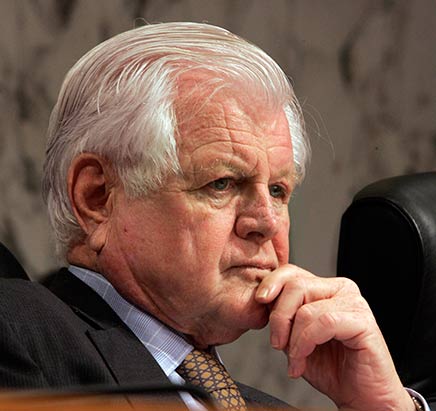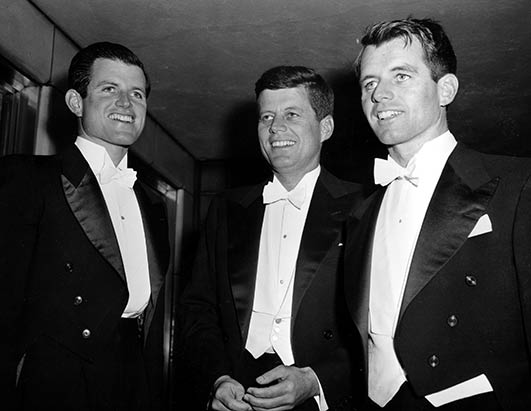
Senator Kennedy at a Senate hearing in May 2008, shortly before his diagnosis of brain cancer(AP Photo/Susan Walsh)
Teddy Kennedy, "Baby Teddy," was the youngest of 9 siblings, and during his 77 years he witnessed tremendous tragedy, including the political disgrace of his father, the untimely deaths of all three of his older brothers and one older sister, the longterm institutionalization of another, and the losses of yet two more before his own passing. He suffered his own personal tragedies, including a cheating scandal while in college, struggles with alcoholism, a divorce, his son's battle with cancer, and his nephew's tragic death in an airplane crash, and terrible missteps, including the Chappaquiddick incident, in which a young woman died as a result of his irresponsible actions, and his presence during an alleged rape by another nephew. But despite all of this and so much more, he served from 1962 to yesterday as a US Senator, that is to say, for nearly half a century, longer than all but two other Senators in US history, with devotion not only to his constituents in Massachusetts, of whom I was once one (and proudly voted for him, in 1988), but to the people of the United States and the world.
A number of obituaries note that it was Kennedy's failed 1980 bid for the presidency, challenging the incumbent president, fellow Democrat Jimmy Carter, that marked a turn in his legislative energies, but one can go back to Kennedy's earliest years in the Senate to find examples of legislation in which his support or imprint is visible. I was thinking of the impact of the Kennedy family, and in particular of Kennedy's two brothers (though I shouldn't slight Eunice Kennedy Shriver, who passed away only a few weeks ago, and whose founding and championing of the Special Olympics is a signal effort of our epoch), and while, as my friend Sally S. notes, President John Kennedy's accomplishments deserve great consideration, not least his and Bobby Kennedy's defusing the potential nuclear war with the Soviet Union during the Cuban Missile Crisis, I think it's essential to note the Senator Ted Kennedy's efforts have affected and will continue to affect millions of Americans for years to come.
A small list of the things he pushed, helped to pass, and devised in conjunction with fellow Democrats, Republicans, or the White Houses during his tenure include: the Immigration Reform Bill of 1965, which opened up the doors for non-European immigration; the Organizational Safety and Health Administration, OSHA, which protects millions of workers across the USA; the 26th Amendment to the Constitution, lowering the voting age to 18, which enabled the direct civic participation of millions of high-school age students; the Americans with Disibilities Act; the 1965 Medicare legislation, which remains one of the indispensible, baseline programs in our society; Title IX, ensuring gender equality in education; the Voting Right Act of 1965, and its extensions, which ensured that African Americans and others could enjoy our Constitutional rights as voters in the South and elsewhere in the US; the constant successful raises of the minimum wage; the Family Leave Act; the establishment of community health centers, quadrupled funding for the war on cancer, and the creation of the National Cancer Institute; the SCHIP legislation, providing health care funding for children; sanctions against the former apartheid regime in South Africa; the peace talks in Northern Ireland; and the COBRA legislation, to just to name a few. Just think of what this country might look like had he not been a force in the Senate.

Teddy Kennedy, then-Senator JFK, and Bobby Kennedy, in 1958 (AP Photo)
It cannot be said enough that despite being a person of tremendous wealth and privilege who could have looked out solely for the interests of his family and his class, as so many in this society choose to do, again and again Teddy Kennedy advanced and supported legislation that helped and empowered people who have the least voice in this society, not the ones who have the most power and social and political capital: the poor and working classes, women, the disabled, people of color, sexual minorities, young people. In this regard, in American history, Senator Teddy Kennedy has few peers, ever, and we should all be thankful to him.
One of his abiding legislative goals, the passage of comprehensive health care reform guaranteeing universal health care insurance to all, is now at the center of a pitched battle in Congress, the media, and the society at large. Several of Kennedy's colleagues suggest that had he been around he might have found "compromises," but the fact is that even when he was around, during the presidencies of Richard Nixon and Bill Clinton, when health care reform proposals arose, he and other reformers dealt with and lost out to the intransigence from the insurance and pharmaceutical industries, the right, and even from the corporatists in his party. Nothing would be more fitting a tribute than out of this sad event would come real health care reform, passed by the Congress and signed by President Obama, behind who Senator Kennedy through crucial supporter during the tense spring of 2008.
One of the saddest things to me is that there is not a single sitting Senator in either party that I can think of who has Kennedy's combination of seniority, vision, courage, determination, legislative skill, or capacity to cajole the opposition party to continue the extraordinary string of progressive legislation he helped to enact. Perhaps another outcome of his passing will be to inspire some of his colleagues to their better natures, to expansive visions, to a deeper sense of what the phrase "a more perfect union" can truly mean.
RIP, Senator Teddy Kennedy, and thank you.
No comments:
Post a Comment